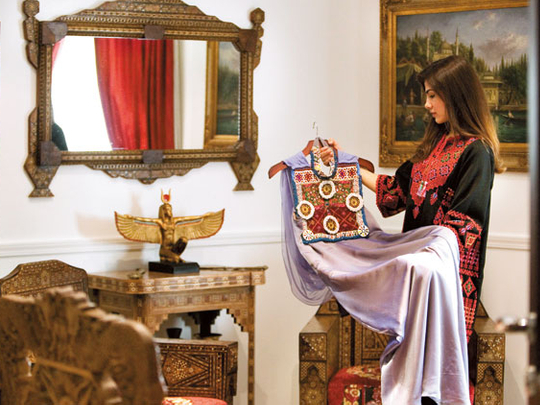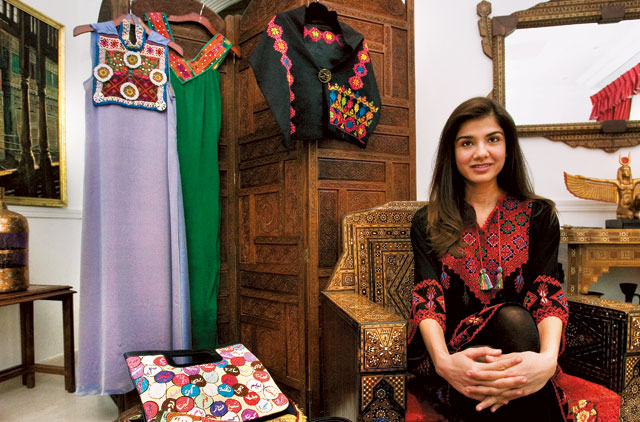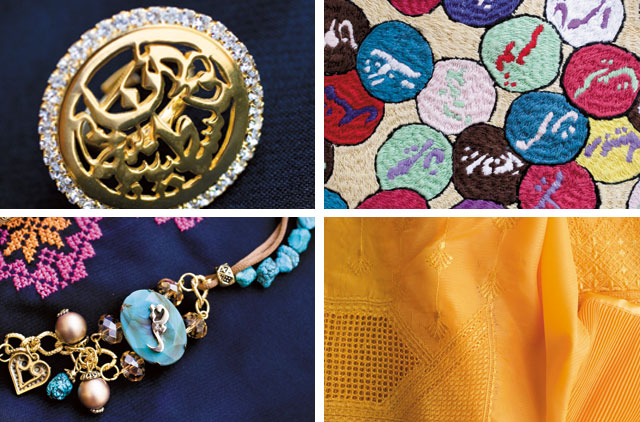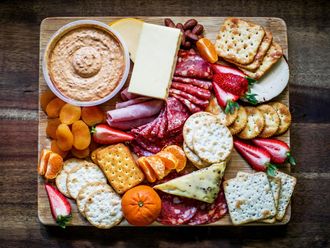
Wilson Mwangi smiles broadly as she walks through her neighbourhood in Nakuru, western Kenya. A girl who was not allowed to attend school because of her speech and hearing disabilities, Mwangi is today beaming with pride because she is successful and prosperous - something not many people in her community can claim to be.
Mwangi is skilled at creating ornaments from wood which are embossed with brass wire work. In fact, the pieces she created have become all the rage in fashion circles in the United Kingdom and countries in Africa.
This was possible because she joined Savannah Chic, an Africa-based organisation founded by Shruti Patel that taps into the talents of artisans to create jewellery. The members of this group are largely women from impoverished neighbourhoods who are given guidance on creating products for the international market. They are paid handsomely for their work and also get a percentage of the company's profits.
Fashion with a purpose
It would seem excelling in traditional and ethnic skills including carving, embroidery and jewellery designing comes naturally to women facing strife and economic challenges. Recognising this, Savannah Chic and other organisations started to pool the creative talent of people in less privileged regions and to find international markets for their products.
Similarly, Palestyle, founded by Zeina Abu Chabban, offers the refugee women of Palestine ideas and capital to create jewellery with international appeal.
Beshtar, founded by Carole Naim, not only markets the hand-crafted arts of Afghanistan but funds many other charities.
Another brand, polly & me, founded by Cath Braid and Rolla Khadduri, supports women of Chitral, Pakistan, who tell their life stories through tapestries.
But what these singular organisations aim to do individually, an international umbrella organisation is doing on a much larger scale and, arguably, more effectively. Called Fashion ComPassion it has become a major retail presence for these individual organisations in several countries in Asia and Africa.
Aisha Mustafa, a Dubai-born entrepreneur who moved to London five years ago, established this organisation in November last year to articulate the dreams of such women. She sees the formation of Fashion ComPassion as the fulfilment of a long cherished dream, explaining, "I do not support fashion for consumption's sake only and feel it can become a catalyst for change by choosing to be socially responsible."
Mustafa, who worked as a management consultant, says she had been inspired to do something for the empowerment of women ever since she interned at the age of 17 with the Bangladesh-based Grameen Bank, which gives micro credit to women to set up businesses. "For several years I had been dabbling with the idea of establishing an ethical fashion house that focuses on social development and empowering women in developing countries. After extensive research and travelling, [last year] I decided to give up my job and start this company.
"The inspiration to form Fashion ComPassion is a combination of my two biggest interests - fashion and philanthropy. While working at the Grameen Bank as an intern, I witnessed first-hand how creating jobs and providing a sustainable solution for the poor had a monumental impact on families and communities.
"I worked in the Bank's various subsidiaries and went to various villages to assess how giving these women access to capital changed their lives. The women were provided capital to start their own businesses, given a mentor who would help them, and worked with other women in the village to make it happen and pay their loans. It was also mandatory for Grameen members to send their children to school.
"This experience had a major influence on me. I wanted to do something that could help women in the developing world. Charity, I realised, is not the way forward and to deal with poverty one has to make people independent and teach them a skill or enhance their skills so they can earn a living. This learning stayed with me and is the backbone of my company: To help women that are talented and creative but don't have a platform to showcase it. I wanted to help create a sustainable solution against poverty for women."
Addressing inequalities
Once Fashion ComPassion was established, Mustafa set about deciding on the labels she wanted to retail. "I knew from the outset even before starting Fashion ComPassion that I wanted to contribute towards empowering women in countries which are among the poorest and most underdeveloped, where women do not get equal opportunities and chances. I wanted to bring out the talent and creativity of these women and portray the positivity and vibrancy of their culture and traditions."
Mustafa's organisation does not go into the nitty-gritty of supporting each and every individual, rather they nurture the regional organisations that work like cooperatives giving a voice to the people of that region. For example, when polly & me started from the sale of tapestries, it raised close to $50,000. This money was given back to the women.
The women then opened their own bank accounts and used the money either to fund their children's education, build a new home, start a business for their husbands or fathers, or they saved the money to use in the future. However, this money was a catalyst for the women as they then wanted to start creating items that were commercially viable and which would give them a salary on a monthly basis.
In the case of Savannah Chic, as the artisans source the products to make the jewellery, the brand pays them beforehand on a per-piece basis. The level of pay is higher than average and also allows them to sell the products in the local market. Savannah Chic's mandate is to give a percentage of profits back to artisans.
Palestyle provides women in refugee camps with materials and design guidance and pays them per item. The wage is above average and women also get 5 per cent of sales of all items, whether made by the women or not.
Beshtar's model is a bit different from the rest. It sources traditional Afghan material and attempts to make it contemporary. The money raised from the sales all goes back to support the Zaher Shah Foundation and other charities that support, for example, education, health and micro credit.
Mustafa, who markets all four brands, elaborates on her business model: "We are a retailer/distributor of high-end ethical fashion that is socially responsible. We work with various brands that have been created to empower women and their communities. These brands promote social development by providing women with jobs, enhancing their creative skills, giving them design guidance, paying them fairly (above the standard wage level in those countries) and giving them a share in the company's profits. And all this while adhering to the social norms of these regions, where most of these women either work from the comfort of their homes or go to centres close to their homes.
This process increases the self-worth of the women and gives them a sense of purpose and achievement. The money the women make by working for these brands is used to fulfil the daily needs of their families, especially their children's.
Altering perceptions
Mustafa chose London which has been her home for five years, as the perfect setting for such an organisation. "London is one of the fashion capitals of the world and I realised there was an opportunity - while there were ethical fashion brands, there was no single business bringing together high fashion that is socially responsible, I wanted to open the European markets for these brands and change the negative image that is associated with these regions in the West. It's my way of giving back to where I am from," says Mustafa, who hails from Pakistan.
Last year when Mustafa launched Fashion ComPassion she was overwhelmed by the response it generated on the UK fashion circuit. "I have had many women's organisations showing a keen interest in my company, artists, key individuals from the fashion industry and also lots of customers who love the products and the stories behind each.''
Profitable endeavour
Mustafa does not shy away from the issue of profitability as she admits she has her commercial interests in mind as well, even though she wants to do it in a manner where she can give back enough to the community. "The model is based on creating a business out of a social issue that is both profitable for the entrepreneur and the community it operates in. I believe that to end the cycle of poverty in the developing world, we need to provide a sustainable solution, especially to the women as they are the building blocks of society. By providing them with employment and a vision to excel, we see a drastic improvement in the lives of their families and societies."
Mustafa plans to expand her operations this year. "Ethical fashion has been rapidly gaining momentum globally, and I think Dubai is a great fashion hub with a great deal of awareness on these issues. Three out of my four brands are Dubai-based.
"In five years, I hope to see Fashion ComPassion as a brand that is known in the ethical fashion industry as a market leader for high-end, socially responsible brands. The vision is to grow Fashion ComPassion in various cities in Europe and the United States."
To know more about this enterprise you can log onto www.fashioncompassion.co.uk or email Mustafa at info@fashioncompassion.co.uk
Making a difference
Who: Aisha Mustafa
What: Started an ethical retail fashion brand called Fashion ComPassion.
Where: London
When: November, 2010
How: See how four fashion labels have empowered the talented yet economically underprivileged women from Asia, Africa and the Middle East who created them.
Tell us the story…
Do you know of a group of people, a company, an organisation or an individual who is striving hard to make this world a better place? Email us at friday@gulfnews.com or the pages editor at araj@gulfnews.com














